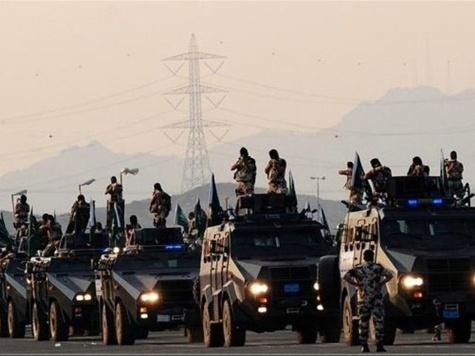
The Sunni Muslim Gulf Cooperation Council (GCC), led by Saudi Arabia, appears to be forming an “Arab NATO” military alliance according to Stratfor Intelligence. The alliance would initially include Morocco and Jordan, but over time it would probably also seek to include the North African states of Algeria, Tunisia, Libya, and Egypt.
As Iran, Iraq, and their allies are “ascendant and the United States [is] pulling back its involvement in the region,” Stratfor believes the Arab states want to expand their military capabilities. Threatened by the rise of a new Shiite Muslim Persian Empire, Sunni Muslims appear to be forming a military alliance that, like the historic Caliphate, would stretch from the Atlantic to Iraq.
Since the Arab Spring began in 2011, the Sunni Arab world has become unstable, just as an increasingly energy-independent United States moves toward “disengagement” with the Middle East. The Syrian Civil War, the violence in Iraq, and the chaos of Yemen are making the Gulf Cooperation Council (GCC) monarchies of Bahrain, Kuwait, Oman, Qatar, Saudi Arabia, and the United Arab Emirates nervous over the rise of Iran. Stratfor believes Iran, despite its “largely obsolete military equipment, remains a potent threat, especially given its asymmetrical capabilities and tools, including its ability to mine the Strait of Hormuz and its ballistic missile arsenal that could strike GCC energy infrastructure in the Gulf.”
Saudi Arabia also fears that back-door diplomacy between the U.S. and Iran appears to be moving towards a lessening of tensions. The U.S. appears unable or unwilling to continue providing blanket security guarantees for the Arab monarchies. Consequently, the GCC is assembling its own strengthened military alliance based on the NATO strategies.
According to the reports, the proposal was presented to Morocco and Jordan at the GCC meeting in late March. The Morocco-based Al Massae newspaper reported that the new military alliance would include the six countries of the GCC – Saudi Arabia, Qatar, the United Arab Emirates, Kuwait, Bahrain, and Oman – along with Morocco, Jordan and possibly Egypt. The alliance would be under a joint command headed by Saudi Prince Mutaib bin Abdullah, currently the head of the Saudi National Guard.
A military force under a joint command would in theory improve the flow and exchange of intelligence and allow the GCC and their Sunni Arab allies to coordinate their response to the increased flow of jihadists into the region due to the Syrian civil war. The alliance would also allow Sunni monarchies to clamp down on internal dissent to safeguard the royal families from independence movements such as the Bahrain Uprising in 2011.
With the training from the U.S. and a massive military modernization, the GCC members are “seeking to improve interoperability and reduce procurement redundancy” in their Peninsula Shield Force. The GCC is already doubling its standing army to 100,000 troops that will operate under a single joint command and control system.
In return for providing large numbers of soldiers to the joint command, Morocco and Jordan would receive continuing financial assistance from the rich Gulf sheikdoms. According to Reuters, the GCC granted Morocco and Jordan a $5 billion financial aid package in 2012, and they would receive a similar level of aid in the future to join the alliance.
GCC members Saudi Arabia and The United Arab Emirates have internal disputes over Qatar’s support for the Muslim Brotherhood and Oman’s friendly relationships with Iran. Other GCC nations support different jihadist factions in the Syrian Civil War that often battle each other as much as fight against the regime of Syrian President Bashar al Assad.
Bringing Jordan and Morocco into the GCC alliance might not do much to enhance the defense in the short run, because their military structure and equipment is less advanced than the current GCC. But over time, expanding the GCC could create a Sunni Muslim NATO force that, like a Caliphate, would stretch from the Atlantic Ocean to the borders of Iraq.
The author welcomes feedback and will respond to comments by readers.

COMMENTS
Please let us know if you're having issues with commenting.